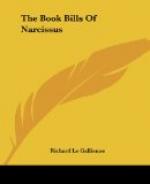He is a born palaeontologist: that is, he can build up an epic from a hint. And, despite modern instances, the old rule obtains for him, he need not be learned—that is, not deeply or abundantly, only at points—superficially, the superficial would say. Well, yes, he has an eye for knowing what surfaces mean, the secret of the divining rod. Take it this way. We want an expression, say, of the work of Keats, want to be told wherein lies his individuality. You take Mr. Buxton Forman’s four volumes, and ‘work at’ Keats! and, after thirty nights and days, bring your essay. On the morning of the thirtieth the poet read again the Grecian Urn, and at eventide wrote a sonnet; and on the morning of the thirty-first, essay and sonnet are side by side. But, by the evening, your essay is in limbo—or in type, all’s one—while the sonnet is singing in our heart, persistently haunting our brain. Some day the poet, too, writes an essay, and thus plainly shows, says the essayist, how little he really knew of the matter—he didn’t actually know of the so-and-so—and yet it was his ignorance that gave us that illuminating line, after all.
I doubt if one would be on safe ground in saying: Take, now, the subject of wine. We all know how abstemious is the poetical habit; and yet, to read these songs, one would think ‘twas Bacchus’ self that wrote, or that Clarence who lay down to die in a butt of Malmsey. Though the inference is open to question,
’I often wonder if old Omar drank
One half the quantity he bragged in song.’
Doubtless he sat longest and drank least of all the topers of Naishapur, and the bell for Saki rang not from his corner half often enough to please mine host. Certainly the longevity of some modern poets can only be accounted for by some such supposition in their case. The proposition is certainly proved inversely in the case of Narcissus, for he has not written one vinous line, and yet—well, and yet! Furthermore, it may interest future biographers to know that in his cups he was wont to recite Hamlet’s advice to the players, throned upon a tram-car.
The ‘true’ poet makes his magic with the least possible ado; he and the untrue are as the angler who is born to the angler who is made at the tackle-shop. One encumbers the small of his back with nameless engines, talks much of creels, hath a rod like a weaver’s beam; he travels first class to some distant show-lake among the hills, and he toils all day as the fishermen of old toiled all night; while Tom, his gardener’s son, but a mile outside the town, with a willow wand and a bent pin, hath caught the family supper. So is it with him who is proverbially born not made. His friends say: ’O, you should go to such-and-such falls; you ’d write poetry there, if you like. We all said so’; or, ’What are you doing in here scribbling? Look through the window at the moonlight; there’s poetry for you. Go out into that if you want sonnets.’ Of




